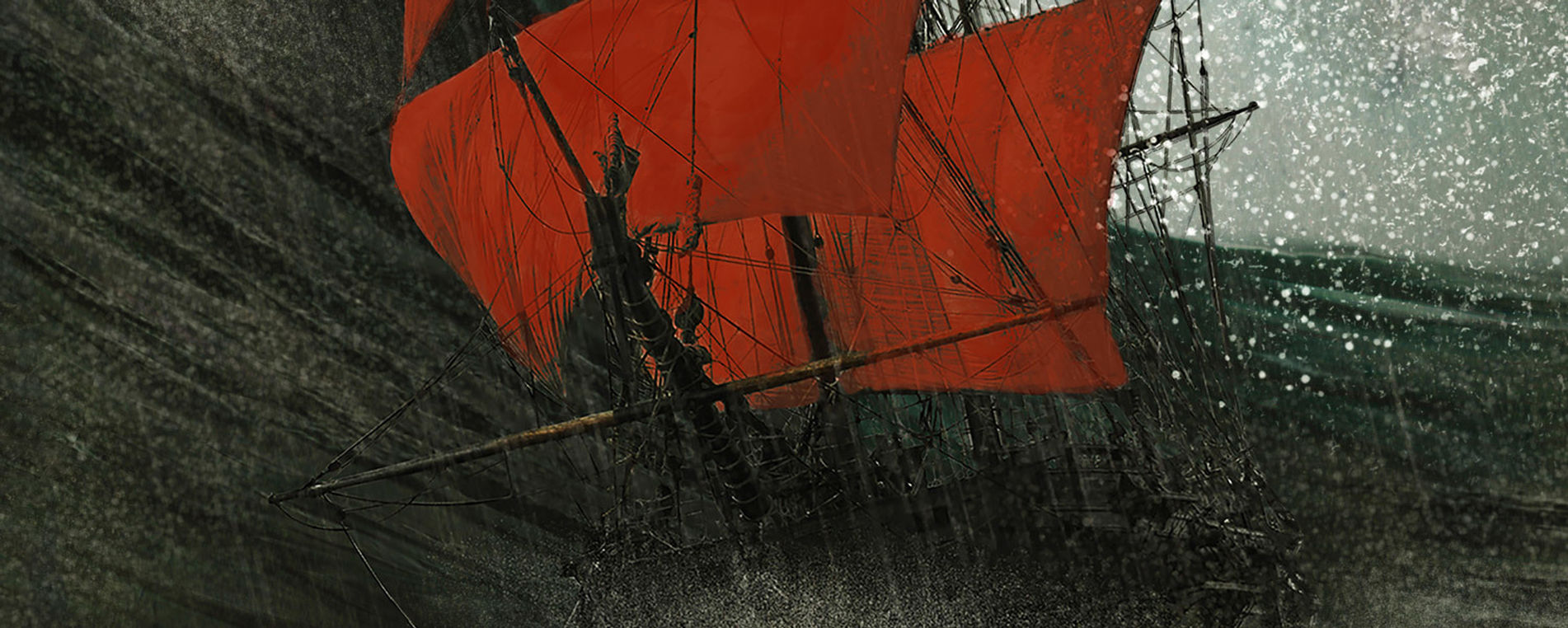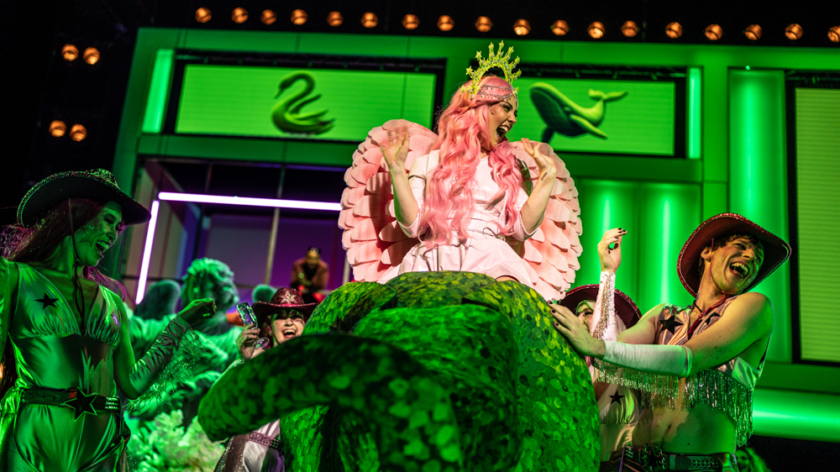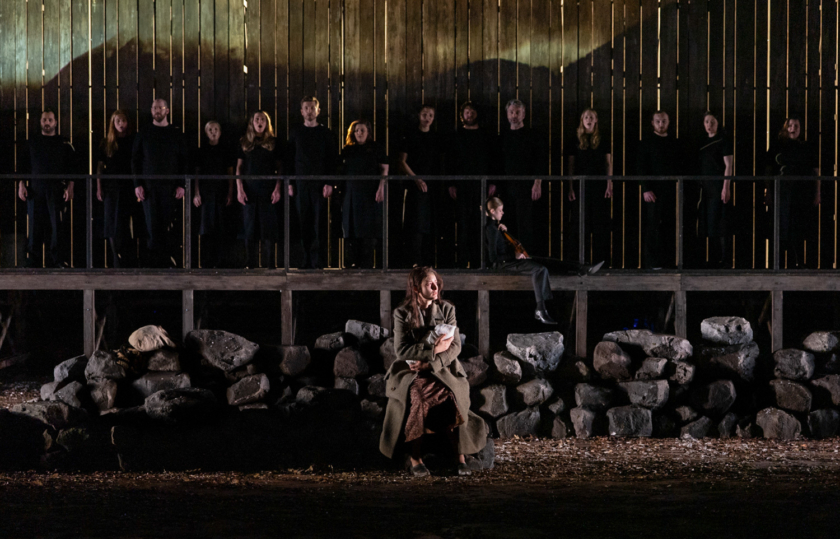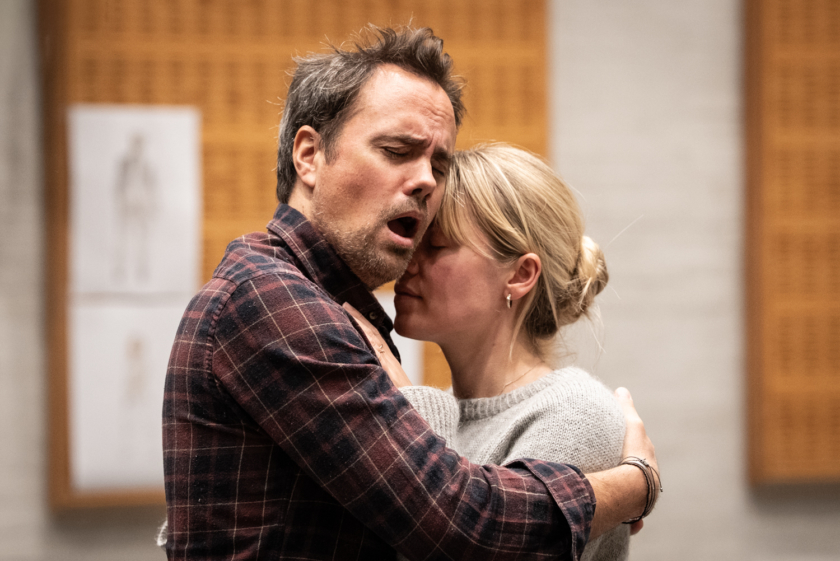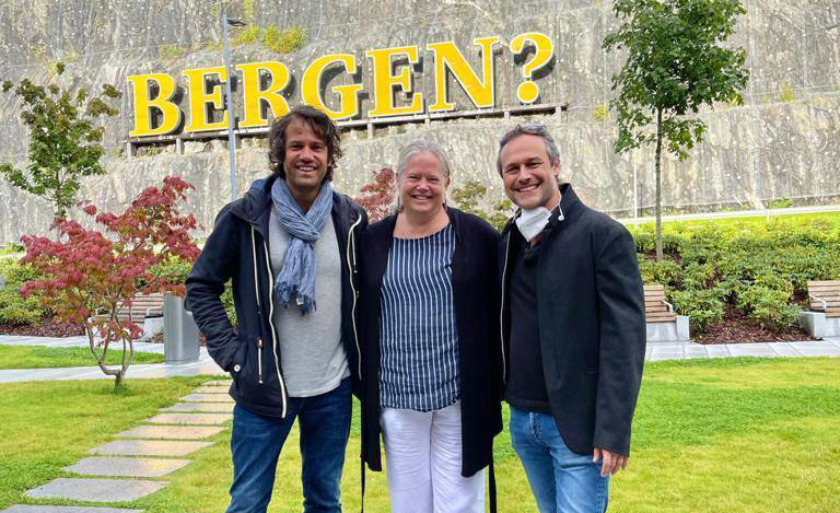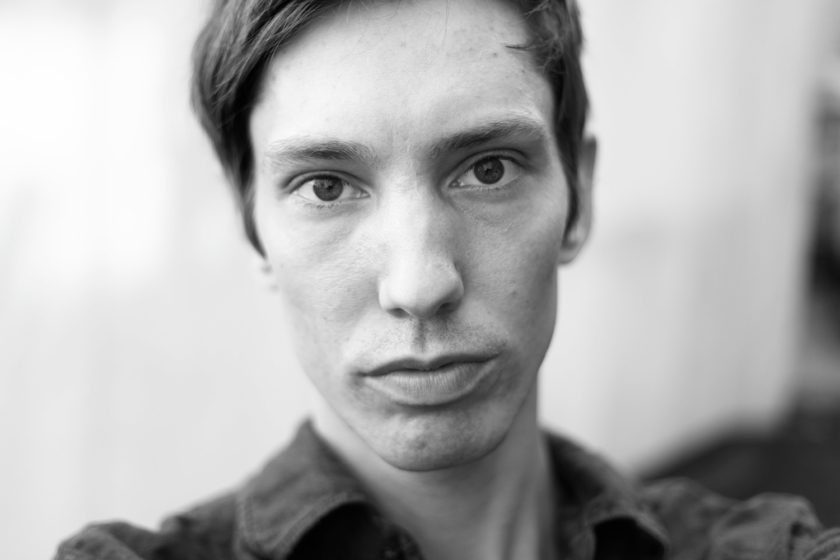Director's diary: First week in Bergen
Day 1 of Bergen
- 5th February 2018
January was a huge month rehearsing a touring production of Mozart's Le nozze di Figaro in the UK. We premiered the show two days ago, I flew straight to Norway the next day, the airline promptly lost my luggage as we transferred to a domestic flight at Oslo.... "The glamour of international opera" I think, as I step into a shower to try and wash the clothes in which I travelled.
But here we are, first day of rehearsals: as always a day of music preparation. The day begins with a meet-and-greet and coffee and cake. I super-swiftly introduce the set again to the gathered singers and crew (poor BNO staff hearing this for a third time!), talking about what the show will look and feel like - hopefully this is my last talk-through. Let's just get started!
During the talk-through, I mention a phrase by a writer called Emily Wilson which I've come to value in the last few weeks while preparing Holländer: "Tragic Over-Living". Meaning that it is possible to live too long, just as the Holländer does, decade after decade of pointless existence. As soon as one applies this phrase to Der fliegende Holländer the opera becomes about the big questions of philosophy - what is the best way of living one's life, what is a life well spent? Must a good life automatically be a long life? Is Love the only reason for living, in the final analysis? Maybe young Senta's self-sacrifice to prove her love and save the Dutchman means she never “over-lives” : she lives her perfect life, her life-choices and her death-choices are flawless. This thinking will inform how we end our show. How stories end is so important, the wrong ending can poison a whole narrative. The last page of all my scores is always covered in notes and thoughts as to what happens after the opera is over- what is next? What does the Happy-Ever-Afterlife look like, feel like for Senta and the Dutchman? The last lines of John Milton’s “Paradise Lost” echo in my head, perversely apt for the Dutchman and Senta’s paradise gained: “They hand in hand with wandering steps and slow, Through Eden took their solitary way”. I’ve already scheduled a specific rehearsal to look at the myriad different ways we can end our production.
Back to immediate practicalities: not all of the cast are with us as yet, the Dutchman himself joins us in a few days being busy in Amsterdam with yet more Wagner, and our Senta, Elizabeth Teige, is nobly attending rehearsal even though she is currently vocally indisposed. I quickly revise the schedule for the next day. At this stage we still have time on our side. I finally meet in person our wonderful maestro Eun Sun Kim, our assistant conductor Olivier P, and of course the rest of the cast: the eminent American Wagnerian Erik Halfvarson is playing Daland, the distinguished Russian tenor out of St Petersburg Sergey Skorokhodov is the lovelorn Erik, the prominent and experienced Finnish mezzo Tuija Knihtilä is luxury casting as Mary, as is the fast-rising, young Norwegian tenor Bror Magnus Tødenes as our Steuermann. They are all in magnificent voice, and I spend the day listening to them sing through the piece, jotting down Maestro's musical insights into the opera, so my direction can reinforce her approach. I can't wait to start on production calls.
Day 2
Staging rehearsals: like Maria Von Trapp, we start at the very beginning, Act 1 Scene. Daland, a merchant ship's captain, is complaining about his bad luck at having to shelter from a storm when only a few miles from home. It is a great privilege to be working with Erik Halfvarson as Daland, one of the most experienced Wagnerians on the planet. We explore what is at stake for Daland, how perhaps his money worries (remember we are setting the production just after the Wall Street Crash of 1929) are dominating his thoughts, making him feel like the Universe is against him. In a way, I belatedly realise, the piece begins with a mini and bourgeois version of the Holländer's accursed predicament, Daland even mentioning how sailors cannot trust in Satan's mercy. Three times we hear the name of the devil in the first few moments of Act 1, a pre-echo of the cursed man in the title role whom we have all come to see. The relationship between Daland and the young Steersman becomes more nuanced and detailed than I thought it could - boss/employee, bully/victim, teacher/student by turns. This is one of the many reasons I love staging opera, the industry returning again and again to the same operas: every work of genius is bottomless, new truths can always be found; we can always renew these timeless pieces for our own age, finding the mirrors for our own needs and emotions. Bror Magnus Tødenes, our Steuermann, and I talk about the character’s back story (by which I mean what his life has been like, as a child, as a young man, to get him to this moment). We even give the character a name, Josef. We decide that he is ambitious, needing promotion so he can marry his girl, and pinning his hopes for his career and future on Daland's patronage, little knowing Daland faces huge money troubles. It's very encouraging to see these two artists begin to forge a rapport. The final session of the day is spent with Sergey Skorokhodov, the very exciting tenor playing Erik (Senta's sometime boyfriend) examining his character, how to make him more than the self-pitying complainer he often is.
It's early days but I'm sensing the possibility of a show that is truly character-driven, real singer-actors performing this massive repertoire with nuance and detail. Both our Daland and our Erik have played their roles many times - the challenge for them and for me is to make it fresh, and I'm enjoying throwing different thoughts of subtexts at them, maybe a few left-field approaches as to how to make these very real human character as complex and paradoxical as every human being is. Daland and Erik only live their life once, every moment is new for them, and that is how it must appear for the audience. This is always difficult for a performer who has lived this same life on stage many times.
Days 3-5
Rehearsals with Elisabeth Teige, the Norwegian soprano playing Senta, proceed apace. At the heart of the opera is Senta’s Ballad, where she sings a song recounting the myth of the Fliegende Holländer. It is a bold move by Wagner (with his librettist’s hat on) to do this - we have heard all of this from the Holländer himself in the previous act. I’m very keen to activate the character of Senta, and we begin to stage the Ballad as a home-spun and improvised performance by Senta of the song. It is always interesting to me when operatic characters (who are not necessarily singers of course) are meant to be actually singing on stage. How does this become clear? How does the character react to the vulnerability of public performance? With Tuija Knihtilä relishing and making much of the role of Mary, the woman into whose care Daland gives Senta while he is at sea, the scene will expand further when Senta’s audience (the female chorus) arrive.
Similarly, the big duet between Senta and her heart-broken boyfriend Erik begins to take on a complex life of its own, especially when we move out of Grieghallen for a day and rehearse at the very lovely Gimle building near the harbour. I always look to go over a scene at least three times in a rehearsal process, but with this second rehearsal, these experienced artists start to find more of the detail I need. Mary Miller, my BNO boss, pops into our rehearsals for an hour or so, and already I’m hoping she can see glimmers of what our final product might feel and look like. I’m obsessed with the audience gaining access to the characters thoughts even when (no, make that particularly when) they are not singing. This clarity of internal monologue makes the difference between a bad show and a great show, in my opinion. Our characters must be deeply human, sometimes surprisingly paradoxical, yet they have to be transparent as well, their reactions and choices plain to every member of the audience. In this way the production will flow, will race by, every new moment following logically from the last.
An interesting moment where the designer and I stumbled on a possible way to interpret the character of Mary: watching the wardrobe team trying to decide on a suitable collar for Mary’s dress sparked an idea of how to motivate her, of making her strive for happiness, love and “normalcy” as much as the Holländer himself, thus tying her in to the central themes of the opera. Character is found in the smallest of details, and ideas can spring from how the team works together.
The first week ends with singers, creative team and resident BNO staff all heading for a pizza together. BNO has a great family vibe, I think, as I look around the table at people chatting and relaxing - you rarely get this friendly, intimate atmosphere in a company. It’s conducive to good work, I’m sure of it. I order a gin and tonic, looking forward to a day off tomorrow, where an alarm will not be set, and batteries can be recharged after a huge start to 2018. Then I shall be raring to get started on Week 2.

Back to immediate practicalities: not all of the cast are with us as yet, the Dutchman himself joins us in a few days being busy in Amsterdam with yet more Wagner, and our Senta, Elizabeth Teige, is nobly attending rehearsal even though she is currently vocally indisposed. I quickly revise the schedule for the next day. At this stage we still have time on our side. I finally meet in person our wonderful maestro Eun Sun Kim, our assistant conductor Olivier P, and of course the rest of the cast: the eminent American Wagnerian Erik Halfvarson is playing Daland, the distinguished Russian tenor out of St Petersburg Sergey Skorokhodov is the lovelorn Erik, the prominent and experienced Finnish mezzo Tuija Knihtilä is luxury casting as Mary, as is the fast-rising, young Norwegian tenor Bror Magnus Tødenes as our Steuermann. They are all in magnificent voice, and I spend the day listening to them sing through the piece, jotting down Maestro's musical insights into the opera, so my direction can reinforce her approach. I can't wait to start on production calls.
Day 2
Staging rehearsals: like Maria Von Trapp, we start at the very beginning, Act 1 Scene. Daland, a merchant ship's captain, is complaining about his bad luck at having to shelter from a storm when only a few miles from home. It is a great privilege to be working with Erik Halfvarson as Daland, one of the most experienced Wagnerians on the planet. We explore what is at stake for Daland, how perhaps his money worries (remember we are setting the production just after the Wall Street Crash of 1929) are dominating his thoughts, making him feel like the Universe is against him. In a way, I belatedly realise, the piece begins with a mini and bourgeois version of the Holländer's accursed predicament, Daland even mentioning how sailors cannot trust in Satan's mercy. Three times we hear the name of the devil in the first few moments of Act 1, a pre-echo of the cursed man in the title role whom we have all come to see. The relationship between Daland and the young Steersman becomes more nuanced and detailed than I thought it could - boss/employee, bully/victim, teacher/student by turns. This is one of the many reasons I love staging opera, the industry returning again and again to the same operas: every work of genius is bottomless, new truths can always be found; we can always renew these timeless pieces for our own age, finding the mirrors for our own needs and emotions. Bror Magnus Tødenes, our Steuermann, and I talk about the character’s back story (by which I mean what his life has been like, as a child, as a young man, to get him to this moment). We even give the character a name, Josef. We decide that he is ambitious, needing promotion so he can marry his girl, and pinning his hopes for his career and future on Daland's patronage, little knowing Daland faces huge money troubles. It's very encouraging to see these two artists begin to forge a rapport. The final session of the day is spent with Sergey Skorokhodov, the very exciting tenor playing Erik (Senta's sometime boyfriend) examining his character, how to make him more than the self-pitying complainer he often is.

It's early days but I'm sensing the possibility of a show that is truly character-driven, real singer-actors performing this massive repertoire with nuance and detail. Both our Daland and our Erik have played their roles many times - the challenge for them and for me is to make it fresh, and I'm enjoying throwing different thoughts of subtexts at them, maybe a few left-field approaches as to how to make these very real human character as complex and paradoxical as every human being is. Daland and Erik only live their life once, every moment is new for them, and that is how it must appear for the audience. This is always difficult for a performer who has lived this same life on stage many times.
Days 3-5
Rehearsals with Elisabeth Teige, the Norwegian soprano playing Senta, proceed apace. At the heart of the opera is Senta’s Ballad, where she sings a song recounting the myth of the Fliegende Holländer. It is a bold move by Wagner (with his librettist’s hat on) to do this - we have heard all of this from the Holländer himself in the previous act. I’m very keen to activate the character of Senta, and we begin to stage the Ballad as a home-spun and improvised performance by Senta of the song. It is always interesting to me when operatic characters (who are not necessarily singers of course) are meant to be actually singing on stage. How does this become clear? How does the character react to the vulnerability of public performance? With Tuija Knihtilä relishing and making much of the role of Mary, the woman into whose care Daland gives Senta while he is at sea, the scene will expand further when Senta’s audience (the female chorus) arrive.

Similarly, the big duet between Senta and her heart-broken boyfriend Erik begins to take on a complex life of its own, especially when we move out of Grieghallen for a day and rehearse at the very lovely Gimle building near the harbour. I always look to go over a scene at least three times in a rehearsal process, but with this second rehearsal, these experienced artists start to find more of the detail I need. Mary Miller, my BNO boss, pops into our rehearsals for an hour or so, and already I’m hoping she can see glimmers of what our final product might feel and look like. I’m obsessed with the audience gaining access to the characters thoughts even when (no, make that particularly when) they are not singing. This clarity of internal monologue makes the difference between a bad show and a great show, in my opinion. Our characters must be deeply human, sometimes surprisingly paradoxical, yet they have to be transparent as well, their reactions and choices plain to every member of the audience. In this way the production will flow, will race by, every new moment following logically from the last.
An interesting moment where the designer and I stumbled on a possible way to interpret the character of Mary: watching the wardrobe team trying to decide on a suitable collar for Mary’s dress sparked an idea of how to motivate her, of making her strive for happiness, love and “normalcy” as much as the Holländer himself, thus tying her in to the central themes of the opera. Character is found in the smallest of details, and ideas can spring from how the team works together.

The first week ends with singers, creative team and resident BNO staff all heading for a pizza together. BNO has a great family vibe, I think, as I look around the table at people chatting and relaxing - you rarely get this friendly, intimate atmosphere in a company. It’s conducive to good work, I’m sure of it. I order a gin and tonic, looking forward to a day off tomorrow, where an alarm will not be set, and batteries can be recharged after a huge start to 2018. Then I shall be raring to get started on Week 2.
See also: Director's diary, part 1
Photos: From rehearsals at Gimle, Friday 9th February



